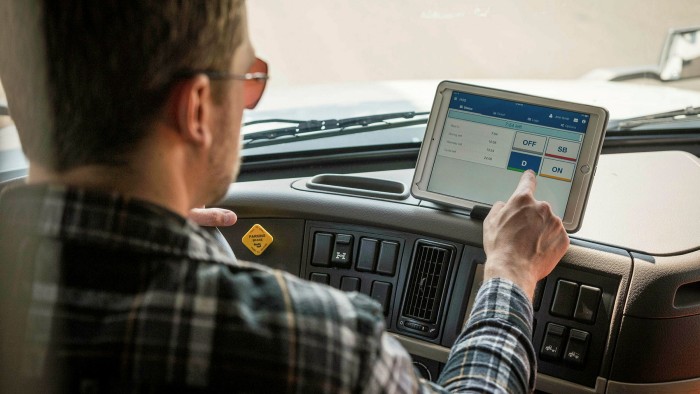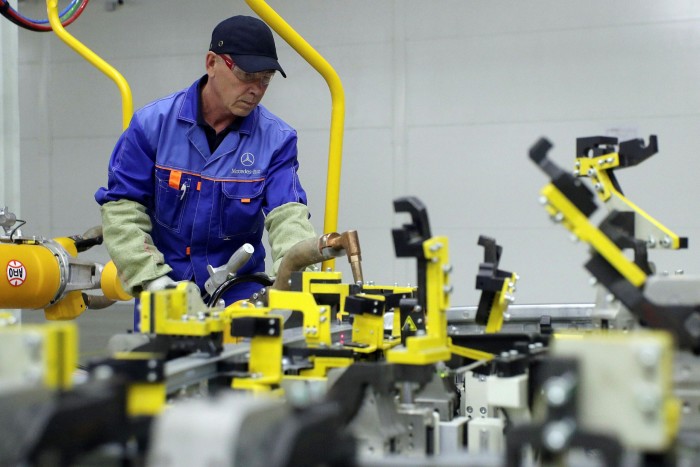Telematics extend ‘co-opetition’ to keep wheels of industry turning

Roula Khalaf, Editor of the FT, selects her favourite stories in this weekly newsletter.
An explosion in demand for home shopping among consumers and continued pressure from businesses to drive down their fleet management costs is driving a wave of dealmaking in telematics.
The evolving technology — once feared for its potential intrusiveness by drivers as it logged vehicle use and journey times — is becoming yet more fundamental to keeping the wheels of industry and retailing turning.
Growing adoption of such recording devices among vehicle manufacturers, and customer demands for open-source interoperability of data collection across their fleets, is also encouraging telematics providers to reassess how they sell their wares and compete with each other.
According to Susan Beardslee, principal analyst at ABI Research, a recent wave of acquisitions and partnerships by telematics companies should enable them to “extend themselves further across the supply chain” and even encourage co-operation between competitors as they embed themselves still further into how vehicle fleets are managed.
The coronavirus pandemic too has also been a catalyst for widening the adoption of telematics technology. The sector has managed to generate important barometers for businesses in monitoring the collapse and subsequent recovery in economic activity in important markets caused by the pandemic.
Geotab is one provider of telematics data intelligence, with 2.2m vehicles being analysed across 100 countries. As Covid-19 began to change how businesses operated at the end of March, Geotab started analysing data to find out how many trips vehicles were taking and for how long, in order to monitor the effect on their customers’ activity.
In May, they then partnered with rival European telematics company Webfleet Solutions to create a combined data set based on 3m vehicles, called the Commercial Mobility Recovery Dashboard.
Colin Sutherland, executive vice-president at Geotab, says: “With Covid, the idea of competition goes away. You do what’s right. We’re friendly with companies in our industry. We’re competing with Webfleet for sales, but the higher purpose of finding outstanding solutions for businesses and better insight — that outweighs anything that has to do with profits and losses.”
Telematics solutions and improved transportation intelligence have also helped with the specific task of lessening human contact with products on supply chain journeys by ensuring fleets are kept clean during the Covid-19 pandemic.
Zonar Systems, another US telematics supplier backed by German automotive giant Daimler Trucks and tyre manufacturer Continental, has added a function to its reporting systems to help check and verify that fleet vehicles have been thoroughly inspected for hygiene standards as well as the core task of keeping track of their mechanical state. “A number of customers have set this up to do their pre-Covid checklist, to make sure that a vehicle has been cleaned correctly,” says Zonar’s chief executive Ian McKerlich.

Helping maximise the reliability of vehicles through constantly monitoring their roadworthiness is an essential selling point for telematics suppliers in helping deliver efficiencies for fleet managers — particularly some major retailers struggling to fulfil large jumps in orders.
Digital sales at US retailing group Target rose by 195 per cent in the second quarter, while Walmart’s sales were up 97 per cent and sales at US grocer Kroger’s went up by 127 per cent in the same period.
Omnitracs is one telematics company aiming to help retailers improve their “dynamic routing” taking into account fleet capacity, delivery time slots and other customer and parking restrictions. The aim is to deliver more, faster.
Geotab also competes in this segment to help manage “last mile” delivery fleets. Six months ago, it served 240,000 last-mile delivery vehicles. During the pandemic, it gained another 60,000.
Innovation in last-mile delivery now also includes experimentation in drone delivery and driverless vehicles. Nuro, a robotics company founded in 2016 by two ex-Google employees, received over £$1bn in funding by February 2019, including $940m from SoftBank, and has since partnered with Kroger, Domino’s, Walmart and CVS. Insights from the technology being developed by Nuro and competitor Starship Technologies could, according to Ms Beardslee, be “highly valuable” to mapping out the potential for automated delivery in suitable markets.
Ms Beardslee describes recent advances in transportation management systems as the first step. Future developments in driving logistical efficiency demand more systems integration, including warehouse management. “The pandemic has raised awareness of the sheer complexity of supply chains,” she says. Now it might accelerate finding the solutions for handling this complexity.
Comments